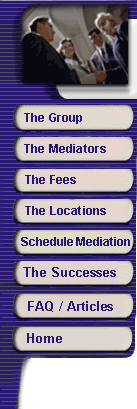
|

|
|
|
CHOOSING THE RIGHT MEDIATOR: A GUIDE TO EFFECTIVE MEDIATION STYLES
(Article courtesy of the San Diego Daily Transcript Law Journal, Mediation is a settlement process where a third-party mediator assists the parties in negotiating a voluntary settlement of a dispute. While mediation is far more cost effective than traditional litigation (usually one day versus years for litigation), it is not inexpensive. Most experienced mediators charge several thousand dollars for a day of mediation, not to mention the cost for attorneys, experts and the value of the parties time away from their own businesses. The market demands a mediator who will give the parties the best chance of settling their dispute. So, how do you choose that mediator? Here are one mediator's views after having mediated thousands of disputes over the past fourteen years. In my view there are two important things that must happen in every mediation. First, there must be a realistic evaluation of the most probable outcome of the dispute if it is not settled in mediation. Second, the negotiations must continue until such time as each side has put their best offer on the table. Without these two things happening, the chances of settlement are significantly reduced. In order to obtain a "realistic" evaluation of the most probable outcome, there must be a full discussion of the issues, preferably in an joint session, where all parties are present and exposed to the other side's point of view. This helps educate the parties and gives them a more realistic view of the dispute. What is learned in this forum is often different from the impressions gained when information is filtered though the attorneys. Furthermore, a joint discussion often provides the parties with a realistic understanding of the issues in dispute and the intensity of the opposing parties position. By directly observing the other party's reaction to factual and legal theories, the parties begin to understand the chances of persuading the other side as to the validity of their own position. After the joint session, the mediator often meets privately with both sides. During the first round of private meetings, I generally explore a number of issues designed to educate the parties as to the most probable outcome if the dispute does not settle in mediation. These issues are generally addressed to the attorneys in order to insure that the client is fully aware of the attorney's "real" view of the case. The issues discussed include the following: strengths and weaknesses of the case; the most probable outcome if the case proceeds to trial; the cost of litigating the case through trial; the attorney's opinion as to what the other side is willing to do; and in fact, what the attorney is willing to recommend to settle the case. At the end of the first round of private meetings, I seek to insure that each party has a realistic assessment of their best case scenario if the case does not settle in mediation. As negotiations proceed, I will continually test the validity of the party's positions arrived at during that first private meeting. Often, assessments change based on negotiations that take place in subsequent meetings, particularly with respect to a party's willingness to accept the risks of litigation. It is essential in any mediation that negotiations continue until such time as each party's best position is on the table. Settlement is most often achieved when the parties are convinced that they have seen the other side's best offer. The mediator's job is to keep the negotiations going until this point is reached. If the mediator does not have the skill or experience to keep the negotiations going, the chances of settlement are significantly reduced. Successful mediators are tenacious. They have the skills to break impasse and keep negotiations going notwithstanding obstacles to settlement. The marketplace demands mediators who will not give up and adjourn the mediation merely because the parties are too far apart. While not every case can settle in mediation, research and experience indicate that over 80% will settle in the hands of a skilled mediator. So what skills does a mediator need to have in order to keep negotiations moving forward? A brief discussion of mediation styles is helpful at this point. Not all mediators employ the same style. Some mediators use an evaluative approach and some use a facilitative approach. The best mediators use both. The evaluative mediator tends to evaluate the issues presented and offer his opinion of what the parties should do to settle the case. This approach is best exemplified by a retired judge who advertised that his settlement conferences are done the old fashioned way: "We beat up on everybody until we make a deal!" The facilitative mediator is less inclined to offer his opinion, but rather, wants the parties to come to their own conclusion as to how the case should be settled. The classic example of this type of mediator is "the frustrated therapist." In my view, the question is not which approach is best but when should each be used. An opinion offered too early in the mediation is less likely to be accepted and may result in the early termination of negotiations. Likewise, efforts to facilitate an agreement without commenting on a party's clearly unreasonable or unrealistic expectations has little chance of success. Different types of disputes call for different styles and both styles may be necessary in the same mediation in order to keep negotiations moving forward. In the early stages of a mediation, I tend to use a facilitative approach to help the parties work through the issues on their own and reach their own conclusions. Evaluative techniques are reserved until the later stages of the mediation when a rapport has been established between the mediator and the party. At this point the mediator's opinions as to the validity of a party's position and suggestions for settlement are more likely to be accepted. Most experienced mediators do not hesitate to evaluate the validity of a party's position and offer suggestions for settlement at the appropriate time. Indeed, most parties expect it. The skill is in the knowing how and when to use both approaches. In order to keep negotiations moving forward, a sense of timing is imperative. The right answer at the wrong time is the wrong answer. Generally, negotiations commenced before the parties have a realistic assessment of their own case are less likely to be successful. I prefer to delay specific negotiations until the parties' expectations for settlement are realistic and the parties positions are within a reasonable range of one another. To start specific negotiations when one party demands $100,000 and the other party is only willing to offer $1,000 may cause the negotiations to bog down before any real progress is made. On the other hand, if the parties' initial positions are grounded on a realistic assessment of their claims, negotiations are far more likely to be successful. For the best chance of success, look for a mediator who has a track record in getting cases settled. Usually you will find that these mediators have the process and legal expertise to insure that the parties have a realistic view of the probable outcome of their case and the negotiation skills necessary to keep the parties talking. While not every dispute is destined for settlement, a tenacious mediator will always "go the extra mile" to reach settlement every time.
|